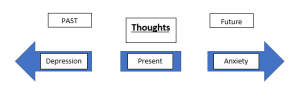Anxiety Symptoms
To better understand your anxious feelings, you could try the Severity Measure for Generalised Anxiety Disorder. This self-assessment tool will help you identify how your anxiety levels compare to the general population.
Let’s take a look at some anxiety symptoms:
- Sometimes your heart starts to race, and you get shortness of breath, you may begin to feel dizzy, and your body may tremble. These are all symptoms that you have a panic attack. Panic attacks, also known as anxiety attacks, are a type of anxiety disorder.
- I am feeling uncomfortable and sweating more than usual when in social situations. Thoughts can be about being an outsider while at a social gathering. These are all signs of social anxiety that may start with leaving early and lead to complete avoidance.
- Anxiety can affect your ability to concentrate or focus. Forgetting things off the shopping list and getting distracted at work are signs of anxiety. The inability to concentrate can make a person useless, which creates further anxiety.
- Are you feeling Nervous? It is normal to feel nervous about an event outside your comfort zone, such as a one-off public speech. However, suppose that anxious feeling is not event-based or based on something that is an everyday task. In that case, it is more severe and likely to be an anxiety disorder.
- A sense of impending doom is generally a sense that something terrible will happen. The phrase itself tells us that there is a high level of fear and uncertainty about something that has yet to happen. The feeling of anxiety comes from a fear of what will happen in the future.
- Perfectionism is the thought that the finished result must be of a very high standard. Perfectionism is not realistic for most of us in a busy everyday life with lots of things to do. It puts a lot of pressure on the individual and could be the underlying cause of anxiety disorders. It could also be a symptom of the anxiety disorder, as doing things of high standard helps reduce anxiety for the person with the disorder.
Overcome Anxiety:

1. Be in the present. It is helpful to think about the past and learn from it. It is also beneficial to think about the future and be better prepared. Also, spend some time in the present, a place where you are free from past regret and future uncertainty. To bring yourself to the present, think about what you see around you, what you can hear, smell, and taste. Use your senses to get yourself to be in the present.
2. Believe in yourself! Having confidence in yourself means that you can handle things no matter the hurdles you have to overcome. You are willing to take on risks and overcome obstacles. Sometimes it is easier said than done.
3. Look at your past accomplishments. What makes you proud? What wise decisions have you made in the past?
4. You are your own worst critic. So it is time to think about what others have said that they admire or like about you. What positive things do your friends say?
5. Do tasks where you feel you have control. Prove to yourself that you are confident.
6. Lower the bar. Things do not have to be perfect. Affirm yourself for giving things a go. Think about how no one is good at everything, and most of the time, it takes practice to build skill and confidence.
7. Diet, Exercise, & Sleep. These three things are essential to keep your body and mind healthy. If they are out of balance, it will increase your anxiety. Start by making three easy changes:
- Go to bed at a regular time.
- Go for a 20-minute walk each day.
- Reduce alcohol and caffeine intake.
8. Just get started. Anxiety can be paralysing, and the longer you wait, the more stress can build.
9. Do something that makes you proud. Activities that will help improve your self-esteem and confidence.
10, Anxiety Benefits. Recognise anxiety as a natural feeling and acknowledge that it is not something you want to
eliminate. Anxiety helps us be productive and meet deadlines. Anxiety helps us avoid dangerous situations where we put ourselves at risk.
Early intervention
Like any health problem seeking early treatment can mean a faster road to recovery.
Start using the cognitive interventions described in this article. Measure the intervention results using the Severity Measure for Generalised Anxiety Disorder tool. If you do not see any improvement, book your first online counselling for free here: https://www.counsellors.co.nz/free-zoom-session/
